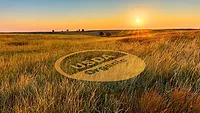The Reverse Oklahoma Land Rush
Update July 4th, 2000, Jarbidge, NV: In a determined expression of rebellion, a group of patriots removed a government blockade of a county road. The "Shovel Brigade" members attacked the debris, that was piled on the road by the US Forestry Service (USFS) in an attempt to block access to a campground, using only shovels and horse teams. Although hundreds were in attendance, the event was non-violent and the adjacent Jarbidge River, a stream ten feet wide by six inches deep, was fully protected from damage during
the work. As always, my opinions are mine alone, and not the responsibility of my employer or any other group.
In case you are wondering what all the fuss is out West with the land grab issues, let me clarify by saying much land is designated public, that is, not in private hands. Sometimes mistakenly called government or federal land, it belongs to the people of America. This differs greatly from the mostly private land holdings
back East. Sometimes we Westerners tend to forget that fact, and do not realize how confusing land issues out here are to those who are not used to dealing with large federal agencies who mistakenly think they own the land.
Much of the economy out West is based on cattle grazing, farming, or mining activities that may rely upon access to public lands. The designated stewards of that land, the Bureau of Land Management and U.S. Forestry Service, are often the front-line interface between the public and the US government. Unfortunately, both agencies have been unduly influenced by radical environmentalists, and their mandates have changed from stewardship, to often outright environmentally-oriented politics. Just visit the USFS employees Web site to get an idea of the "greenie" orientation by many of their employees. Although all are government employees, and forbidden to engage in politics while on the job, many use their positions to further attacks on mining, ranching, and logging, even to the extent of having environmental slogans printed on their business cards.
One example claimed by an outdoor recreational group states the USFS "Road Moratorium" (also known as the Roadless Initiative) proposal was released for public comment in January 1998. Although the USFS swears the proposal never was released outside the agency until then, many letters dated December 1997 exist in the files. Who are these letters from? Surprise! Many have been traced to the Earthjustice Legal Defense Fund formerly known as the Sierra Club Defense Fund. So, did the USFS break the law by catering to the greenies before ordinary Americans, and if so, how much of the proposed policy was influenced by them?
The coordinated political effort to lock up public land from access now includes about 20 percentof those lands. More acres are added every week. The "Roadless"area proposals are what attorneys call red herrings; these areas are neither roadless nor require restricting access. The definition of a road is self-serving. One USFS definition claims if the road is not intended to be maintained for highway travel, it cannot be called a road. And who determines what roads are maintained? You guessed it - the USFS. Obviously, if access is restricted, ranching, mining, and logging cannot occur, and that is exactly what the political agenda calls for.
One more blatant practice falls under what is called CARA, or the Conservation and Reinvestment Act. This allows the government to sell public land, and buy "environmentally sensitive lands" with the proceeds. These purchased lands are forever locked up from access, or any development. Abuses have already surfaced claiming the government favors certain developers and full value was not paid for the land.
Disturbing CARA provisions include funding radical greenie groups with the sale proceeds, yes - the same people trying to prevent mining, ranching and logging in the first place! Other provisions call for the ability to effectively condemn private land that resembles a wildlife area, or environmentally sensitive area, or one that looks cute, or you name it. For areas targeted by political groups, tying up land around the area effectively shuts down use of that area. This is what we call a "bad thing," in technical terms.
"Resign yourself that the struggle never ends, that victory can never be claimed, and that you are ever vigilant." Sage words from another era. Please be safe!
Looking for a reprint of this article?
From high-res PDFs to custom plaques, order your copy today!


